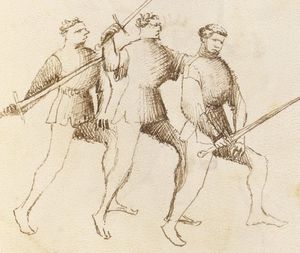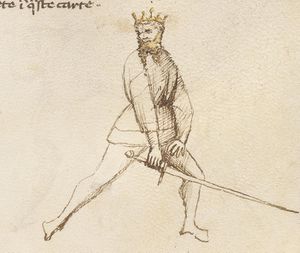|
|
You are not currently logged in. Are you accessing the unsecure (http) portal? Click here to switch to the secure portal. |
Fiore de'i Liberi/Sword in One Hand
Images |
Images |
PD |
Morgan Transcription [edit] |
Getty Transcription [edit] |
|||
|---|---|---|---|---|---|---|---|
[1] We are three players who want to kill this master. One that will deliver a thrust, the other a cut (taglio), the other wants to throw his sword at the said master. So that it will be a great spectacle for him not to be killed, God make him very sorrowful. |
We are three players that wish to strike this Master. One would strike with the point, another the edge, and another wants to throw his sword against the aforesaid Master, so that it will be a great feat indeed if this Master is not killed. Would that God made him very crafty. |
[17v-a] Noii semo tri zugadori che volemo ferir questo magistro. Uno gle di trare de punta l'altro de taglo, l'altro vole lanzare la sua spada contra lo ditto magistro. Si che bene sera grande fatto ch'ello non sia morto questo magistro. Che dio lo faza ben tristo. |
|||||
[2] Whether throwing the sword or striking cuts and thrusts, You are bad, and of this art know little. You do things which have no place in words. Come then, one by one, who can do it. And even if you were one hundred, I would wound you all, because of this guard, which is a good and powerful thing. I advance (acresso) the foot which is in front a little out of the way and with the left I pass traversing. And in this passing cross beating the swords I find uncovered and surely I will make injuries. And if a spear or sword is thrown at me, all will be beaten away, as I said, passing out of the way, as you will see in my plays hereafter. I pray you to look at them. And even with a sword one-handed I will do my art, as is shown in these papers. |
You are wicked and of this art you know little; you do things that words cannot describe. Come one by one whoever knows what to do and is able, and even if you are a hundred I will waste all of you with this guard (which is so good and strong). I advance my forward foot slightly out of the way, and with my left I step to the side. I cover myself during that step, beating your swords and finding you uncovered, and I will be certain to strike you. And whether lance or sword is thrown at me, I will beat them all just as I have said, stepping out of the way according to that which you see in my plays hereafter. Watch what I show to you, and with the sword in one hand I will make my art. |
[17v-b] Voi sete cativi e di questa arte save pocho. Fate gli fatti che parole non ha logo, vegna a uno a uno chi sa fare e po. Che se voi fosse cento tuti ve guastaro per questa guardia ch'e cosi bona e forte. Io acresco lo pe ch'e denanci uno pocho fora de strada. E cum lo stancho io passo alla traversa. E cum quelo passar io me covro rebatendo le spade, ve trovo discoverti, e de ferire ve faro certi. E si lanza o spada che me ven lanzada, tute le rebatto come i'o ditto passando fora de strada, segondo che vui vederite gli mie zoghi de dredo, de guardagli ch'io ven prego, e pur cum spada a una man faro mia arte |
|
[13a-c] Per lançare de spada e trare taiio e punta |
|||
[3] With a step, I have made a cover with my sword [Described in the previous Getty and Morgan text.] |
[13a-d] Cum passo o fata coverta cum mia spada |
||||||
[4] Here I have struck you in your head |
[13b-b] Aqui io t'o ferido in la tua testa |
[11r-a] ¶ Hic ego sanguineo percussi vulnere frontem. | |||||
[5] In this way, I uncover you to strike you with my point What the master said I have done well; that is I passed out of the way making a good cover. And I find the player uncovered, so that I surely want to put a thrust in his face. And with my left hand I want to try to make your sword go to the ground if I can. |
I have done that which the Master has said, that is, I stepped out of the way making a good cover. And I found the player uncovered such that I certainly want to thrust my point in his face. And I want to try this with my left hand, to see if I can make your sword hit the ground. |
[17v-c] Quello che ha ditto lo magistro io l'o ben fatto, zoe ch'io passai fora de strada fazando bona coverta. E lo zugadore trovo discoverto. Si che una punta gle voio metere in lo volto per certo. E cum la man stancha voio provare. Se la tua spada posso in terra fare andare. |
|
[13b-d] Per tal modo te discrovo[!] per ferirte de punta |
[11r-d] ¶ Derideas me voce tua / cecumque vocato / | ||
[6] Again I have struck your head without stepping In everything I have found you uncovered, and I surely have injured you in the head. And if I want to pass forward with the rear foot, I can do a lot of gioco stretti against you; that is binds, breaks and wrestling. |
I have found you completely uncovered and I have struck you in the head for certain. And if I want to step forward with my rear foot, I can make many narrow plays against you (that is, the binds and breaks of grappling). |
[17v-d] In tuto t'o trovado discoverto, e in la testa t'o ferido per certo. E s'io cum lo mio pe de dredo voio innanzi passar asai zoghi stretti poria contra ti fare, zoe in ligadure roture, e in abrazare. |
|
[14a-a] Anchora la testa t'o ferida sença passare |
|||
[7] Because of the hand that I have placed under your elbow, I can injure you with a cut (taglio) and a thrust. Also, if I advance (acresco) the forward foot, I can bind you in ligadura mezana, which is drawn before, at the 3rd play of the 1st Master, Dagger Remedy. Also, I can do this play which is after me. And in this way I can injure and also bind you. [In the Getty, the Scholar's opponent has his right foot forward. In the Paris, the Scholar wears a crown.] |
|
[13b-c] Per la mane ch'i'o posta sotto tuo elzo |
|||||
[8] With my left arm, I have bound your right Your sword and your arm are well entrapped, and you cannot free yourself, that you don't get hurt by my way, because you seem to know little of this play. [In Vadi, the Scholar's opponent stands with his right foot forward.] |
|
[14a-c] Cum lo mio braço stancho lo drito t'o ligado |
[27v-c] ¶ Quam prudenter ago spatam propriumque lacertum | ||||
[9] Because of the way in which I have caught your sword, Here I can injure you well, and disarm your sword without fail, turning it around the hand, I will make you turn, in a way that it is better for you to release the sword. |
|
[14a-b] Per lo modo ch'i'o presa la tua spada |
[11v-d] ¶ Arbitror a manibus ensem tibi carpere lentis / | ||||
[10] For that you could overthrow (batter) the swords you must come into the binding (Translation by Anonymous) [This Master appears to be missing his crown.] |
[28r-b] ¶ Ut mihi tu posses ensem convellere leva | ||||||
[11] I will make you turn with the left hand Here I can injure you in the front, and this is not enough for me, for pinching you at the elbow I will make you turn, to injure you in the rear, and I will shove my sword at your neck, so that you will not defend yourself from this. |
|
[14a-d] Cum la man mancha io te faro voltare |
[12r-d] ¶ Cumque manu voluam cubitum voluendo cruentum | ||||
[12] Because of the turn that I have given you by your elbow For that play which is before me, in the way I made you turn, and immediately I shoved my sword to your neck. If I do not cut your throat, then I am sorrowful and foolish. |
|
[14b-a] Per la volta che per tuo cubito t'o data |
[12r-b] ¶ Nunc ego perpendo medium scidisse mucrone | ||||
[13] This is a good break of the point on the ground You cast a thrust at me, and I beat it to the ground. You see you are uncovered, and I can injure you. Again, I want to make you turn, to injure you worse. And I will injure you in the middle of you back. |
|
[14b-b] Aquesto e un bon rompere de punta a terra |
|||||
[14] I have sending you to the ground in my thoughts: For the turn I made you do, pinching you by the elbow, to this part I have come well and immediately, for the chance to shove you to the ground, so that you do not make war on me nor any other again. |
|
[14b-c] De mandarte in terra ii'o mio pensir |
|||||
[15] Either your sword is bent or it is broken This one I dragged by the head, and I beat his sword. I have come to this part. Also, I will make you turn, not to fail. And I put the sword to your neck, while I am daring. |
|
[14b-d] O la tua spada e piegada overo ch'e rota |
|||||
[17] In order to wound you again with this, my point, This is a play in which, wanting to be armoured wants to put a thrust. When someone delivers thrusts and cuts, you do the cover, and immediately put this to him in the way that is drawn. [The Getty image resembles the Pisani-Dossi, including the lack of armor.] |
This is a play in which he who wants to thrust the point wants to be armored. When someone strikes at you with the point, or with the edge, make the cover and immediately thrust this in the way that is depicted. |
[19r-a] Questo e uno zogo che vole essere armato chi vole metere tal punta. Quando uno te d tra de punta, o de taio, tu fai la coverta, e subito metegli questa per lo modo ch'e dipento. |
|
[13b-a] Per ferirte anchora cum questa mia punta |


